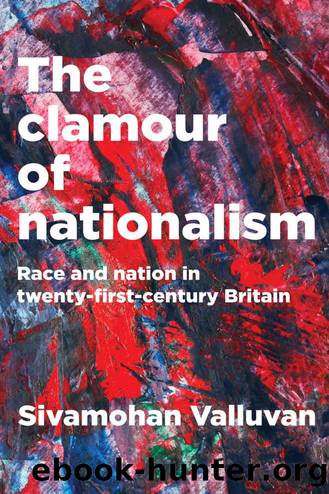The clamour of nationalism by Valluvan Sivamohan

Author:Valluvan,Sivamohan
Language: eng
Format: mobi
Publisher: Manchester University Press
Published: 2019-07-25T14:00:00+00:00
Pathologies of poverty
Much of what has been asserted above might seem presumptuous. It would be right to ask here what exactly are these ascribed meanings and stereotypes that render the non-white outsider so dysfunctional according to a neoliberal metric. It is simply not enough to say that neoliberalism is racially inflected, as this is merely to assert a tautology. Closer substantiation of how certain prevailing representations of various outsider groups obtain an unfavourable neoliberal judgement is therefore required.
As signalled at the beginning of this chapter, neoliberalism is not simply an economic or legislative programme, but is also actively involved in the modelling and realisation of the ideal subject – as self-reliant, responsibilised and entrepreneurial. And while no one is free of the cultural circuits that encourage such dispositions, it is to be understood that various ‘regimes of representations’41 do in fact characterise certain backgrounds as being particularly ill-suited to neoliberal selfhood – or put more abstractly, as unable to realise the freedom that neoliberalism mandates.
As has been common across much of this book’s substantive canvas, three subjects become particularly aberrant here: black people, Muslims and immigrants. All three – at times one and the same – become subject to certain presumed shortcomings in the popular imagination, wherein they are condemned to a condition of dependency antithetical to the individual autonomy that neoliberalism extols. It should once again be stressed that a dependency stigma is common to all neoliberal moralising – for instance, the demonisation of the working-class indolence that a far too generous welfarism is alleged to have bred.42 I contend, however, that these ascriptions are particularly resonant when given certain ethno-racial coordinates.
The young black subject suffers, for instance, from two complementary renditions of neoliberal condemnation. The black male in particular, often conceived as being all body and no mind (all intuition, no culture), is ascribed a condition of wanton nihilism.43 Seen as the vanguard for an urban decay from which all other dysfunctional street cultures stem, the black male is accordingly seen as lacking the work ethic or betterment agenda that is central to neoliberalism. This ubiquitous representation of the black male, one that also sanctions the routine over-policing of him and his peers, is made available in every new iteration of an urban crime scare.44 The irony is, of course, that the hip-hop, grime and now drill soundscapes that are routinely submitted as evidence of criminal indolence (see, for instance, David Goodhart’s essay, ‘The riots, the rappers and the Anglo-Jamaican tragedy’)45 are themselves ambivalently suffused by many of the hustler and graft mythologies held dear by neoliberalism,46 what Gilroy calls the ‘neoliberal thematics of uplift, self-responsibility and self-improvement’ married with the ‘hustling ethic affirmed in several generations of Hip-hop’.47 Or as Mark Greif argues, the rich mythology of intense hustle and material pleasure that energises much hip-hop is best read as a phantasmagorical revelation of the very thing that it is not – namely, the sheer destitution and material abjection that characterises the backgrounds of the rappers and the inner-city black spaces that they often hail from.
Download
This site does not store any files on its server. We only index and link to content provided by other sites. Please contact the content providers to delete copyright contents if any and email us, we'll remove relevant links or contents immediately.
| Anarchism | Communism & Socialism |
| Conservatism & Liberalism | Democracy |
| Fascism | Libertarianism |
| Nationalism | Radicalism |
| Utopian |
The Secret History by Donna Tartt(16622)
The Social Justice Warrior Handbook by Lisa De Pasquale(11489)
Thirteen Reasons Why by Jay Asher(7788)
This Is How You Lose Her by Junot Diaz(5770)
Weapons of Math Destruction by Cathy O'Neil(5036)
Zero to One by Peter Thiel(4824)
The Myth of the Strong Leader by Archie Brown(4789)
Promise Me, Dad by Joe Biden(4447)
Beartown by Fredrik Backman(4415)
Stone's Rules by Roger Stone(4415)
How Democracies Die by Steven Levitsky & Daniel Ziblatt(4398)
The Fire Next Time by James Baldwin(4342)
100 Deadly Skills by Clint Emerson(4076)
A Higher Loyalty: Truth, Lies, and Leadership by James Comey(4032)
Rise and Kill First by Ronen Bergman(4012)
The David Icke Guide to the Global Conspiracy (and how to end it) by David Icke(3881)
The Farm by Tom Rob Smith(3872)
Secrecy World by Jake Bernstein(3782)
The Doomsday Machine by Daniel Ellsberg(3730)
